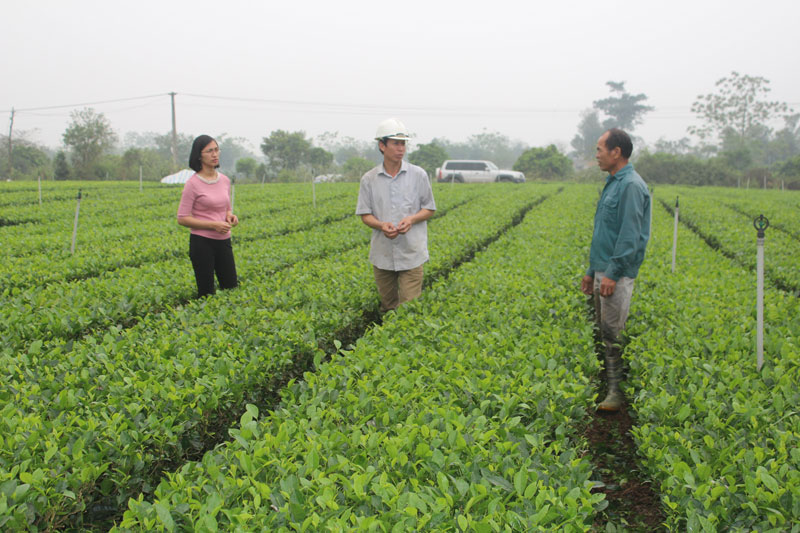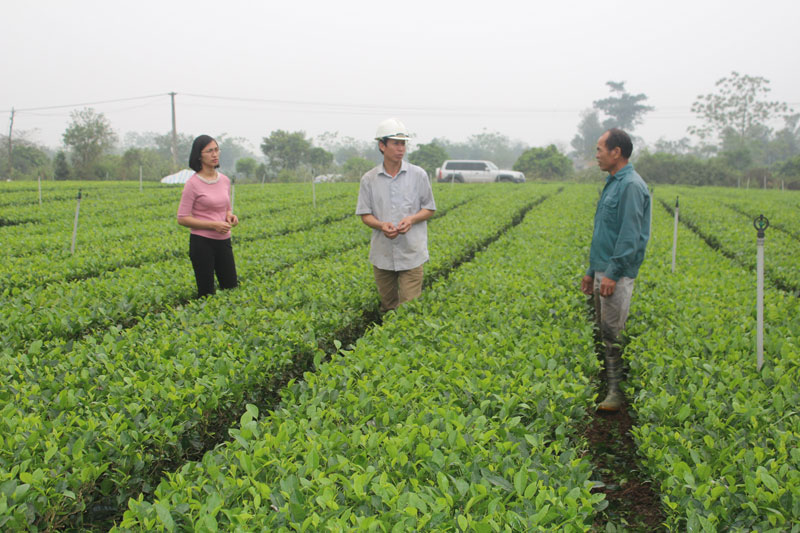
(HBO) - Lac Thuy district is currently home to a total 250 ha of tea-growing land, of which 170 ha being high-yield tea, mainly in farms across the communes of Phu Thanh, Phu Lao, Co Nghia, and Dong Tam. Cultivation techniques brought about significant changes in recent years.

Director of
Duong Nam cooperative Duong Ngoc Chuc (centre) discusses, shares experiences in
food safety standards ensured tea production with staff of the Agriculture and
Rural Development office of Lac Thuy district and locals of Phu Thanh commune.
To further promote the district’s
socio-economic development targets, especially in agriculture, Lac Thuy
continues to pay heed to the recovery of some plants, notably tea among
industrial trees.
The Party Committee of the district aims to
issue a resolution detailing the development of a tea-growing zone based on the
one of the Song Boi One Member Company Limited. The area has raked in stable
income worth about 200-240 million VND (8,620-10,350 USD) per ha annually.
The issuance and implementation of a
resolution is hoped to recover and build brand for Lac Thuy tea, bolstering its
consumption in the domestic and international markets.
According to the Agriculture and Rural
Development office of Lac Thuy district, the tea cultivation has contributed to
creating jobs and raising income for local people. Currently, besides tea and
some other key plants, the district eyes production meeting food safety
standards.
The district is building brand for Lac Thuy
tea, among other products in the One Commune One Product (OCOP) programme. To
realise the target, the district’s Agriculture and Rural Development office
provided guidance for local people to produce tea in a safe procedure and
devised planning for a tea-growing zone under VietGAP standards, thereby
completing documents for brand building of local tea and for the product in the
OCOP programme.
The roadmap on building Lac Thuy tea brand
will be launched in 2019 and expected to complete in 2020, affirmed Ngo Dinh
Tam, head of the district’s agriculture and rural development office./.
According to data from the Hoa Binh Provincial Party Committee, the industrial production index for the first six months of 2025 is estimated to have increased by 20% compared to the same period last year. This marks the highest year-on-year growth rate for this period since 2020.
In the first six months of 2025, Hoa Binh province’s export turnover was estimated at 1.145 billion USD, marking an 18.11% increase compared to the same period in 2024. Import turnover was estimated at $ 804 million, a 17.15% increase, which helped the province maintain a positive trade balance.
The lives of the ethnic minority farmers in Tan Lac district have gradually improved thanks to the new directions in agricultural production. This is a testament to the collective strength fostered through the professional associations and groups implemented by various levels of the district’s Farmers’ Union.
With the motto the "product quality comes first,” after nearly one year of establishment and operation, Muong village’s Clean Food Agricultural and Commercial Cooperative, located in Cau Hamlet, Hung Son Commune (Kim Boi district), has launched reputable, high-quality agricultural products to the market that are well-received by consumers. The products such as Muong village’s pork sausage, salt-cured chicken, and salt-cured pork hocks have gradually carved out a place in the market and they are on the path to obtaining the OCOP certification.
In the past, the phrase "bumper harvest, rock-bottom prices" was a familiar refrain for Vietnamese farmers engaged in fragmented, small-scale agriculture. But today, a new spirit is emerging across rural areas of Hoa Binh province - one of collaboration, organisation, and collective economic models that provide a stable foundation for production.
Maintaining growing area codes and packing facility codes in accordance with regulations is a mandatory requirement for agricultural products to be eligible for export. Recently, the Department of Agriculture and Environment of Hoa Binh province has intensified technical supervision of designated farming areas and packing facilities to safeguard the "green passport" that enables its products to access international markets.



